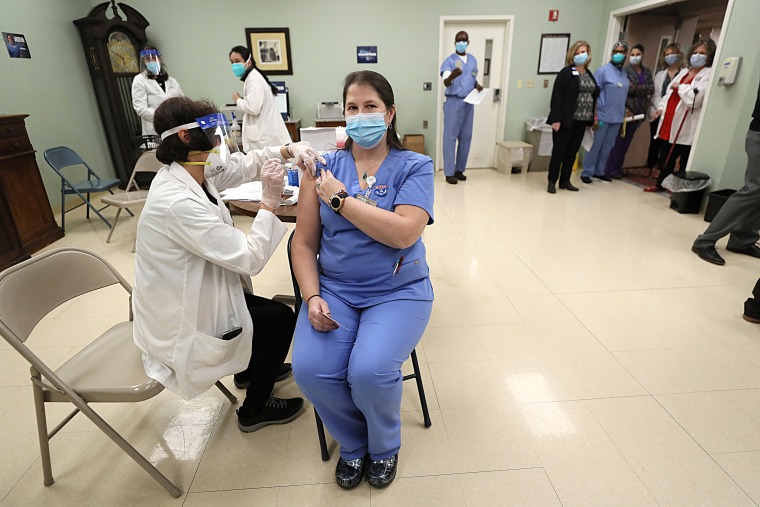People in nursing homes are much more likely to die of Covid-19 if the staff caring for them remains largely unvaccinated, a study published Wednesday in the New England Journal of Medicine found.
The research, from Harvard Medical School and the University of Rochester in New York, is based on data from 12,364 nursing homes — or 81 percent of such facilities in the United States — collected this past summer as the delta variant spread throughout the country.
Full coverage of the Covid-19 pandemic
As of June, Covid vaccination rates among staff members varied widely, from 31 percent to 83 percent, the study found.
When researchers looked at the impact on residents' health through August, the effects, they said, were glaring.
Covid-19 cases among residents whose staff had the lowest vaccination rates were nearly double compared to facilities with the highest staff vaccination rates.
And Covid-related death rates among residents in low-vaccination facilities were nearly three times that of facilities with the highest levels of staff vaccination.
The finding held even when nursing home residents themselves were vaccinated against Covid, said Brian McGarry, one of the study’s authors.
“Even though the residents are protected with their vaccination, they’re still relying on an additional layer of protection from the staff,” McGarry, an assistant professor in the division of geriatrics and aging in the Department of Medicine at the University of Rochester, said.
The data used in the study came mainly from the Centers for Medicare and Medicaid Services.
The study's results frustrated those who care for older people. By far, people over age 65 have accounted for the greatest percentage of Covid-19 deaths in the U.S.
"Where is the national outrage?" said Dr. Michael Wasserman, who heads the public policy committee of the California Association of Long Term Care Medicine.
Wasserman said it's clear that people living in nursing homes and long-term care facilities continue to be infected and, in turn, fall severely ill, by staffers who care for them day after day.
"We know that nursing home staff are a key vector for transmitting the virus," Wasserman said. Throughout the pandemic, he said, it's been the nursing home staff providing the majority of the care for their long-term residents. Outside family members have largely been turned away because of Covid-19 protocols.
Download the NBC News app for full coverage of the Covid-19 pandemic
Nursing home residents are among the most vulnerable to severe illness from Covid-19.
“By definition, any illness is going to be more serious for them,” said Dr. James Powers, a geriatrician at Vanderbilt Medical Center in Nashville.
“They may have diabetes, they may have heart disease,” he said. “Those make you predisposed to worse infections.”
That means that even in nursing homes with higher rates of staff vaccination, the residents remain at risk.
Last month, the Biden administration mandated that all health care workers be vaccinated against Covid-19, a move that has since been put on hold by a federal court order.
The delay in vaccine mandates alarms geriatricians like McGarry.
"It was such a sigh of relief when the vaccines were rolled out last December and January," he said. "Nursing home residents were first in line, and we all watched the case numbers and death numbers drop."
Now, McGarry said, he and his colleagues say they hope enough safeguards are in place to curb further spread.
The idea is to keep nursing home residents "safe as community spread picks up again, heading into Christmas and winter when viruses typically flourish."
Follow NBC HEALTH on Twitter & Facebook.

